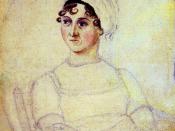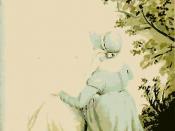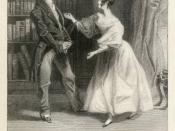Pride and Prejudice is one of the most popular novels written by Jane Austen. This romantic novel, the story of which revolves around relationships and the difficulties of being in love, was not much of a success in Austen's own time. However, it has grown in its importance to literary critics and readerships over the last hundred years. There are many facets to the story that make reading it not only amusing but also highly interesting. The reader can learn much about the upper-class society of this age, and also gets an insight to the author's opinion about this society. Austen presents the high-society of her time from an observational point of view, ironically describing human behavior. She describes what she sees and adds her own comments to it in a very light and easy way. She never seems to be condescending or snubbing in her criticism but applies it in a playful manner.
This playfulness, and her witty, ironic comments on society are probably the main reasons that make this novel still so enjoyable for readers today. Some rules and characteristics depicted in the story seem very peculiar and are hard to conceive by people of our generation. Nevertheless, the descriptions of the goings-on in that society are so lively and sparkling with irony that most people cannot help but like the novel. Jane Austen applies irony on different levels in her novel Pride and Prejudice. She uses various means of making her opinion on 18th century society known to the reader through her vivid and ironic descriptions used in the book. To bring this paper into focus, I will discuss two separate means of applying irony, as pertaining to a select few of the book's characters. The novel is introduced by an omniscient narrator, unknown to the...


